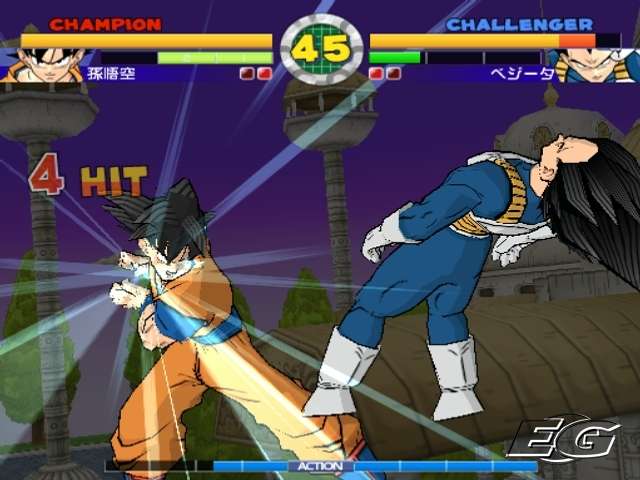Super Dragon Ball Z
Don’t let the title fool you.
It could easily be argued that the beat-'em-up genre is by far the hardest to break these days. Between Street Fighter and Virtua Fighter, the hardcore market is more or less sorted while flashier affairs like Marvel vs Capcom 2 and Soul Calibur 3 do their bit to keep even the gamer with the shortest attention span entertained. So, despite the Budokai series doing pretty well with fans, Atari has decided to take the Dragon Ball series back to the drawing board and come up with a whole new way of playing as Goku and friends/rivals/enemies. Well, to be more accurate, what they've actually come up with is a whole old way of doing things...
The major change here is a shift from the old Budokai control mechanic to a far more Street Fighter-inspired set of commands, working in the usual array of fireball and dragon punch inputs where once may have been a sizeable combo string. As such, it works perfectly well and you're able to pull off all kinds of fancy cancels and juggles once you get a feel for your chosen character. In fact, the main drawback is that while Budokai's setup distanced it from the hordes of other fighters from which it obviously drew influence, now we're left with what could be most any churned-out 3D fighter since the launch of the PlayStation. There are a few nice inclusions here, such as the homing attacks to chase down foes and an action gauge to limit your powers of flight and dashing abilities. But even these make it hard to get around the fact that this feels far less like a Dragon Ball game should than previous titles, largely due to the fact that it has been ‘dumbed down' and slotted into a generic template in order for it to appeal to a larger audience.

The game's strongest element by far is its RPG-esque character progression, allowing you to bolster move sets and abilities through levelling characters up from constant combat. With each new level comes access to new special or super moves as well as more general enhancements like improvements to attack strength or increased weight to make them harder to toss around with juggle combos. But as well as simply levelling up your chosen fighter, there's a second way to enhance abilities - by rounding up the seven Dragon Balls in any of the play modes, you can visit Shenron and make a wish. This can grant further character abilities or even add to the roster and with each visit to the dragon himself, a selection of new options becomes available. With the balls being so ridiculously easy to collect here, you'll be seeing an awful lot of Shenron, no bad thing really since he's got what the merchant from Resident Evil 4 would no doubt call "a selection of good things, stranger".
Of huge concern, though, is the extremely limited number of play modes on offer. Practice obviously allows you to work on specials and chains to your hearts content, Arcade lets you go at the original coin-op version of the game with the need to constantly throw money at it and the only console addition, Z Survivor, pits you against opponents of varied ability with between-bout prizes being dished out to keep you playing. It's here that the majority of your time with the game will be spent, building up your custom character as best you can. But given the variety of the opponents, it's all too common to happen upon a stupidly powerful enemy in the first couple of fights, effectively ending your game there since their massively enhanced abilities make them a real chore to take down.
While the Budokai series may not have enjoyed the universal appeal of more traditional brawlers, it did at least give the games their own unique identity. In sacrificing that, Super Dragon Ball Z becomes just another paint-by-numbers 3D fighter, sitting alongside the likes of Battle Arena Toshinden and Star Gladiator in the ranks of the also-rans. There's nothing glaringly wrong with this more conventional approach to the anime adaptation and there's a good amount of variety present within the admittedly limited cast. As such, Super Dragon Ball Z makes a good starting point from which for its inevitable sequels to hopefully flourish but on its own merits, this is little more than a reasonable fighting experience that seriously lacks longevity.
